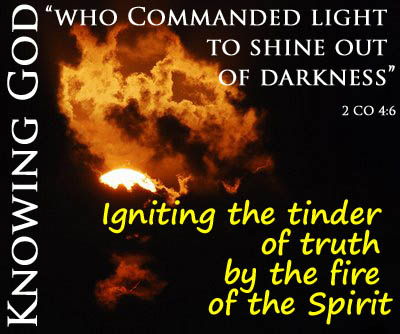
Knowing God—A Study in 2nd Corinthians
Moving Beyond Knowledge into Experience—
Igniting the Tinder of Truth by the Fire of the Spirit
This conference was presented in Northern Virginia February 28–March 2, 2014.
“For it is the God who commanded light to shine out of darkness,
who has shone in our hearts to give the light of the knowledge
of the glory of God in the face of Jesus Christ.” 2Co 4:6
Second Corinthians is much more than just a defense and vindication of Paul’s ministry. It expounds the foundation of his life and service in the experiential knowledge of God in all His varied manifestations to Paul. In other words, Paul was who he was, and did what he did, because he continued to grow in his knowledge of God. This knowledge was not merely intellectual or academic. Rather it was essentially experiential, as Paul came to know the living Christ in his daily life.
Gene Cunningham - April 8, 2000
Simplicity in Christ #3

2Co 11:3 Paul writes with dread or fear that Corinthian believers would be led astray and miss out on simplicity, purity in Christ—single-minded focus. Jesus thanks the Father that divine truth has been revealed to those who are dependent (i.e., "babes"). In Mat 11:25-30, Jesus asks those who are weary and heavy laden to come to Him. His "yoke"—or "school of learning"—is light, easy. Three factions united against Christ (Mat 22:15-46). The Pharisees thought keeping the law made you righteous and falsely thought they could gain salvation by works (Rom 8:3). Herodians believed that Herod Agrippa fulfilled the prophecies. Saducees believed there was no resurrection, and the body and soul die together.
Most Jews cared about their heritage (Mat 22:27-32). Saducees thought they could present a contradiction. Jesus responds by telling them "you do not know the scriptures, nor the power of God." We become "like angels"—not angels (Isa 6:3). Angels' focus is not on each other, but the Lord. In the resurrection we are totally devoted to Him (Mat 22:29-32; 1Co 15:12-58; 1Jo 3:2).
How did Jesus approach Scripture? This approach will greatly simplify our lives.
As the very Word of God (2Ti 3:16). Scripture is divine revelation;
It is inspired and accurately recorded. Jesus referred to Isaiah (Mat 13:14; 2Pe 1:21);
Scripture needs to be taken literally (Mat 21:42, Mat 4:4); it has authority over us;
The Word of God is eternal in nature (Joh 10:35; Mat 24:35);
The Bible has a united theme, namely, redemption (Luk 24:27);
The Word is powerful and relevant to us now (Joh 4:10, Joh 7:38; Heb 4:12).
It may appear contradictory to us; the problem is in us; it began with the Fall (Luk 8:11).
Jesus asks the Pharisees who the Christ is; He silenced them (Mat 22:34-46). We need to not question Him either.
Scripture References: John 7:38, Matthew 22:15-46, Matthew 13:14, John 4:10, Matthew 11:25-30, John 3:2, Luke 24:27, Matthew 22:29-32, Matthew 24:35, Matthew 22:34-46, Isaiah 6:3, John 10:35, Luke 8:11, Matthew 22:27-32, Matthew 4:4, Hebrews 4:12, Romans 8:3, Matthew 21:42
From Series: "2018 AYC Ladies Classes"
Nan Cunningham spoke to the ladies at the 2018 AYC Camp.

